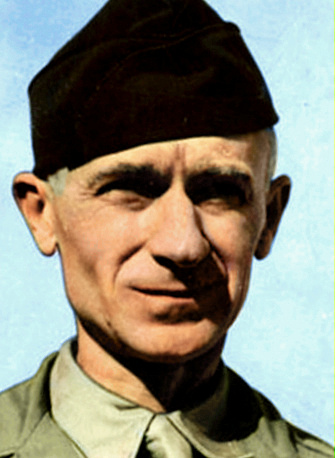63 Nazi fighters downed by Yanks
…
Yanks seize peak in Italian drive
…
World jurists also to convene
…
Selection delayed by Superfortress raid
…
Land at Lucena in liaison planes
…
WITH U.S. THIRD ARMY, Germany (UP) – The Medal of Honor was presented yesterday to a former Illinois farmer who has never carried a gun in combat but has been in the heaviest fighting since Normandy.
Pvt. Harold A. Garman, 27, of Albion, Illinois, a medical aide, received the award from Lt. Gen. George S. Patton Jr., commander of the U.S. Third Army.
Pvt. Garman swam the Seine River in Montereau, France, under heavy machine-gun fire to pull back unaided four wounded soldiers trapped in an assault boat.
Picture of legless veteran and bride is finest kind of moral builder
By Ruth Millett
…

By Ernie Pyle
OKINAWA (by Navy radio) – The LCVP in which I rode shoreward on Love Day morning at Okinawa was so crowded the men just stood against each other. I knew most of them for they were all from the ship that brought us up.
They had been riding for an hour before they picked us up off the control boat and they were soaked to the skin from the spray.
The morning was warm and sunshiny, yet they had all gotten very cold just from being wet. Some of them got the cold shakes and couldn’t stop. They joked with each other about quaking with fear, instead of cold. We all smiled sort of sickly like.
We talked most of the way., but I can’t remember much of what we said. We were all sort of tensed up inside.
These Pacific islands have one bad feature that we never had to contend with in any of the European invasions. And that is a reef that lies just under water, three or four hundred yards out. Hence a boat of any size can’t run up to the beach, for it can’t get over the reef.
Consequently, we had to transfer again about a half mile from shore. We ran up along a fleet of amphtracks – amphibious tractors – which were waiting there for us.
Start last lap
These are like big trucks, only they’re on tractors. When in the water the tractor treads, built cup-like propel the thing along, the moment it touches bottom it crawls along like a tractor. They can go miles to sea or miles inland, either one.
Our packs were so heavy it was hard to get from one boat to the other. It took our load about 10 minutes to transfer. And then we started the last lap, the one that really counted.
The terrific bombardment had completely stopped about a minute before H-Hour. By now almost an hour had passed, and the ships were again firing spasmodically.
Small fires were burning inland and a great cloud of black smoke rose from the airport up on high ground. But the pall of smoke and dust which had covered the beach had blown away, and we could clearly see the men on shore and the wave ahead of us landing.
No firing ahead
We had all expected to go onto the beach in a hailstorm of tracer bullets, mortar shells throwing sand, and artillery shells whistling into the water near us. And yet we couldn’t see a bit of firing ahead. We hoped it was true. We hoped.
While we were hoping, somebody took out his canteen and had a drink. People get awfully thirsty as they approach a beachhead. The canteen went around. When it came to me, I took a big gulp, and almost choked. For it wasn’t water at all but straight brandy!
During the bombardment and all during the landings a lone four-engined Liberator bomber flew slowly back and forth over the beach. We marveled at his audacity for he seemed an easy target for ack-ack. Yet he didn’t seem to get shot at.
Nonchalant Liberator
Liberators are too big for carriers to handle so it would have had to come all the way from the Philippines or Iwo Jima or Saipan. We presumed it carried photographers. It seemed incongruous, lumbering around up there alone so nonchalantly.
We were musing on the Liberator when suddenly the amphtrack hit bottom, tilted way over on one side as though it was going to upset, then tilted back with a big thump that almost threw us off our feet.
We were crossing the coral reef. It was a good crossing at that. The water was smooth and there were no rollers on the reef. The gods were goods to us on that invasion day.
The weather was warm and spring-like. The sun shone brightly. There was no wind. it couldn’t have been better.
From the reef on in, the amphtrack joggled and tilted at it rode the rough coral bottom. Then at last it climbed out of the water and onto the sand.
We ran up about 20 feet from the water’s edge. The driver let down the ramp that forms the rear end of the amphtrack and we stepped out. We were on Okinawa an hour and a half after H-Hour without getting shot at and we hadn’t even got out feet wet.
The first words I heard on Japanese soil were from an incredulous Marine who said: “Hell, this is just like one of MacArthur’s landings.”